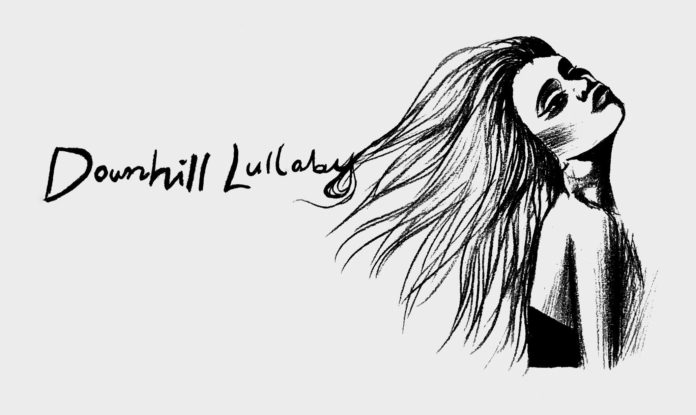The album cover for Sky Ferreira’s new single “Downhill Lullaby” draws a line back to Julee Cruise’s artwork for her 1989 record “Floating into the Night.” The latter acted as a debut for the dreamy vocalist and a soundtrack for director David Lynch’s original conception of the television phenomena “Twin Peaks.” Both of these images share a pitch black background with a bronzed figure fading into dusk. The empty space is ominous and threatens to absorb the only source of light. Cruise’s six-minute masterpiece titled “The World Spins” closes her album and stimulates existential emotion during a critical moment in the show’s plot arc. It is truly the sound of a subject lightly floating into the unseen. Cruise’s voice hangs in the air as if she’s drifting away from the Earth, and this natural transcendence is deeply felt. Few artists ever create a work of such beautiful clarity. Sky Ferreira is trying, and for the first time in six years, the 26-year-old pop dissident has released original music.
Ferreira’s ties to Cruise are strengthened by an acting appearance in “Twin Peaks: The Return” and “Downhill Lullaby’s” production credit from the show’s music supervisor Dean Hurley. She’s clearly attracted to Lynch’s sci-fi hyperbole and bizarrely charming textures. This post-modern flirtation with music history is found throughout Ferreira’s sporadic career. In 2017 she opened for 1970s new wave pioneer Debbie Harry and her band Blondie. A few weeks later she shared a cover of Til Tuesday’s 1985 single “Voices Carry.” The original features triumphant synths true to the decade but Ferreira’s clever adjustments make the song her own. Her voice echoes for effect as she sings, “He wants me, but only part of the time. He wants me, if he can keep me in line.” The song is performed from the perspective of a woman in a struggling and volatile relationship. On her adaptation, the pulsating drums bubble until she releases her breath into the concerned but graceful command, “hush hush.”
After signing to Capitol Records at 15 years old, Ferreira’s music career is yet to materialize into something more than bright flashes of potential. She released her first and only studio record in 2013 and titled it “Night Time, My Time.” The daring and revealing cover art was shot by provocative filmmaker Gaspar Noe. Ferreira’s lead single “You’re Not The One” remains her finest work to date because it begins to imprint an identity. It tells a blunt romantic tale but she uses that framework to express passionate disillusionment on a macro level. The grind of playing industry politics with rigid marketers molded her into a young but experienced pop singer who refuses to blush. The cultural machine often relies on presenting an idealized image of adolescence, but her career path makes us question if this model is sustainable in a largely digital landscape where young musicians feel confident in calling their own shots. Despite an uneven debut record, her confidence to stand up to executives and corporate types shows a personal vision she is willing to fight for.
In 2015, she teased her forthcoming album titled “Masochism,” but no singles were released until “Downhill Lullaby.” The risk of alienating fans by promoting a new and mysterious record for four years is generally reserved for established legends, not for youthful up-and-comers. We live in an age where the early brand gets the worm and an artist can fall into obscurity by being crushed underneath ephemeral contexts and trends. She is yet to reveal the details for why her career has unfolded in this unorthodox way but so far she’s proved that catching onto a compressible commercial style is not her main priority.
“Downhill Lullaby” is mysterious but deliberate. Her spunk on “You’re Not The One” is dried up and replaced by morose fears of displacement. The drums rise and crash like ocean waves in a storm while haunting strings slide through the tension. While it lacks joy, it still conveys interesting intent and artistic purpose. Ferreira repeats words more than she rhyms, but the emotional effect is found in the production. Cruise created elegance through stylistic reduction on “The World Spins,” and now Ferreira is contributing her angst to that conversation. Much like the subject she embodies in the song, we don’t learn what awaits at the bottom of the hill, but her confidence nudges the listener to keep waiting for these secrets. This stage of her career may just be a prolonged beginning.
![]()































